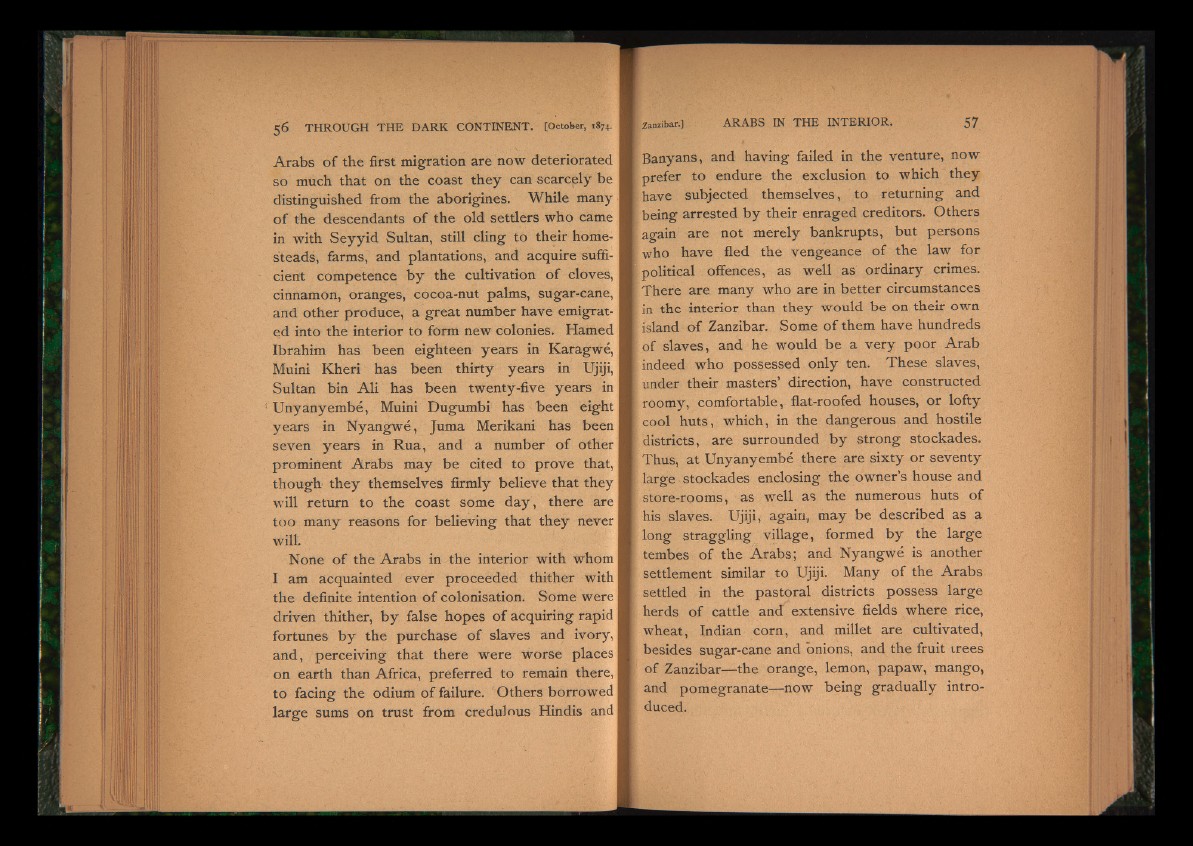
Arabs o f the first migration are now deteriorated
so much that on the coast they can scarcely be
distinguished from the aborigines. While many
o f the descendants o f the old settlers who came
in with S e y y id Sultan, still cling to their homesteads,
farms, and plantations, and acquire sufficient
competence b y the cultivation o f cloves,
cinnamon, oranges, cocoa-nut palms, sugar-cane,
and other produce, a great number have emigrated
into the interior to form new colonies. Hamed
Ibrahim has been eighteen years in Karagwé,
Muini Kheri has been thirty years in Ujiji,
Sultan bin A li has been twenty-five years in
j Unyanyembé, Muini Dugumbi has been eight
years in N y an gw é , Juma Merikani has been
seven years in Rua, and a number o f other
prominent Arabs may be cited to prove that,
though th ey themselves firmly believe that they
will return to the coast some d a y , there are
to o many reasons for believing that th ey never
will.
None o f the Arabs in the interior with whom
I am acquainted ever proceeded thither with
the definite intention o f colonisation. Some were
driven thither, b y false hopes o f acquiring rapid
fortunes b y the purchase o f slaves and ivory,
and, perceiving that there were worse places
on earth than Africa, preferred to remain there,
to facing the odium o f failure. Others borrowed
la rg e sums on trust from credulous Hindis and
Banyans, and having failed in the venture, now
prefer to endure the exclusion to which they
have subjected themselves, to returning and
being arrested b y their enraged creditors. Others
again are not merely bankrupts, but persons
who have fled the vengeance o f the law for
political offences, as well as ordinary crimes.
There are many who are in better circumstances
in the interior than they would be on their own
island o f Zanzibar. Some o f them have hundreds
of slaves, and he would be a v e ry poor Arab
indeed who possessed only ten. These slaves,
under their masters’ direction, have constructed
roomy, comfortable, flat-roofed houses, or lofty
cool huts, which, in the dangerous and hostile
districts, are surrounded b y strong stockades.
Thus, at Unyanyembé there are s ix ty or seventy
large stockades enclosing the owner’s house and
store-rooms, as well as the numerous huts o f
his slaves. Ujiji, again, may be described as a
long straggling v illa g e , formed b y the large
tembes o f the Arabs; and Nyangwé is another
settlement similar to Ujiji. Many o f the Arabs
settled in the pastoral districts possess large
herds o f cattle and extensive fields where rice,
wheat, Indian corn, and millet are cultivated,
besides sugar-cane and onions, and the fruit trees
o f Zanzibar-—the orange, lemon, papaw, mango,
and pomegranate— now being gradually introduced.